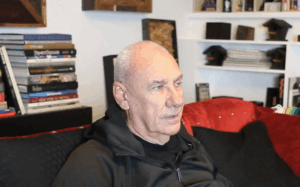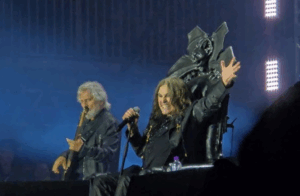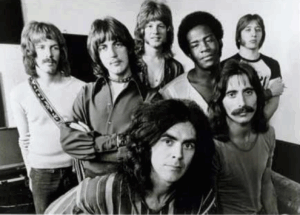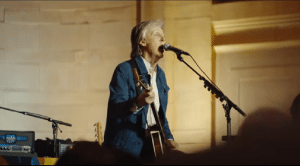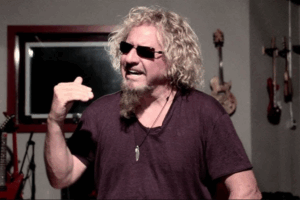The Story Behind Robert Plant’s “Perfect Zeppelin” Song
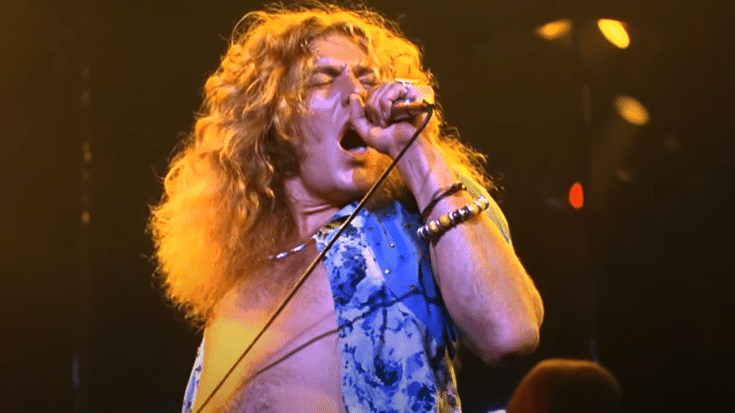
via OLD TAPES / YouTube
Led Zeppelin’s iconic singer, Robert Plant, shared his thoughts on why “Kashmir,” a standout from the band’s “Physical Graffiti” album, represents the zenith of their musical journey. More than three decades after its release, Plant’s words shed light on the profound significance of this track and its enduring legacy within Led Zeppelin’s catalog.
Plant’s Hope for “Kashmir”
The song holds a special place in Led Zeppelin’s history as the closing track on side two of the “Physical Graffiti” double album. Plant’s sentiments reflect the purity of “Kashmir” – a composition that perfectly encapsulates the essence of Led Zeppelin.
“I wish we were remembered for Kashmir more than Stairway To Heaven. It’s so right; there’s nothing overblown, no vocal hysterics. Perfect Zeppelin.”
“Kashmir” stands tall among Led Zeppelin’s numerous musical achievements. It shares the same class and distinction as other monumental tracks like “Whole Lotta Love” and “Stairway To Heaven.” Such songs have transcended musical boundaries to attain universal recognition as timeless classics. Within “Kashmir,” one finds the convergence of rock, funk, and even a hint of an African dust storm, exemplifying Led Zeppelin’s multifaceted approach to crafting rock music.
The song’s origins trace back to a journey Plant undertook through the barren landscapes of southern Morocco. Originally titled “Driving To Kashmir,” “Kashmir” emerged from his experiences on a single-track road that cut through the desert, framed by sand ridges on either side. The opening lyric, “Oh let the sun beat down upon my face, stars to fill my dreams,” captures the essence of the limitless road that inspired the song’s creation.
“It was a single-track road which neatly cut through the desert. Two miles to the east and west were ridges of sand rock. It looked like you were driving down a channel, this dilapidated road, and there was seemingly no end to it.” – Plant said.
View this post on Instagram
“Kashmir” possesses a distinct rhythmic quality that took shape during a late-night session involving guitarist Jimmy Page and drummer John Bonham at Headley Grange.
The haunting and ominous feel of the track was enhanced by orchestral overlays, breathing life into its mood. The song, temporarily shelved due to bassist John Paul Jones’s departure, resurfaced during a productive period at Frencham Ponds hotel.
“It was just Bonzo and myself,” Page said. “He started the drums, and I did the riff and the overdubs, which in fact get duplicated by an orchestra at the end, which brought it even more to life. It seemed so sort of ominous and had a particular quality to it. It’s nice to go for an actual mood and know that you’ve pulled it off.”
After arranging a deal with Jones, which involved the band moving to the luxurious Frencham Ponds hotel (except for Page, who stayed at Headley), Zeppelin resumed their work in early 1974. During this time, the intensive process of creating “Kashmir” was completed. Jones contributed by sketching out the orchestral portions with his Mellotron. Plant, however, faced challenges. Though he was pleased with his lyrics, he confessed feeling “petrified” and even on the verge of tears when trying to sing along to the unique rhythmic pattern of “Kashmir.”
Plant later recalled:
“It was an amazing piece of music to write to, and an incredible challenge for me. The essence of the song is… not grandiose, but powerful. It demanded some sort of special expression or abstract lyrical framework that captures the concept of life as an adventure, a series of illuminated moments.”
The composition was finalized with the inclusion of real string and horn parts, recorded at Olympic Studios in London in May of that year.
This culminated in the completion of an epic rock classic – a panoramic and immersive track that fully encompassed the signature Zeppelin sound.
Was “Kashmir” the pinnacle of Led Zeppelin’s accomplishments? Robert Plant believed so. In subsequent years, Jimmy Page noted:
“Well, it was certainly one of them.”
The grandeur of “Kashmir” perfectly aligned with Page’s growing ambitions, fueled by a desire to silence critics who had hounded Led Zeppelin since its inception. “Physical Graffiti” was an album defined by its expansiveness (featuring the band’s longest and shortest tracks). Within this context, “Kashmir” was poised as the crowning jewel – Page was determined to showcase Zeppelin’s diverse musical palette, surpassing even their closest rivals like the Stones in terms of creativity and credibility.
View this post on Instagram
Eagle-eyed listeners could catch glimpses of Page’s ongoing fascination with the occult, subtly woven into the song’s lyrics. Lines like “Talk and song from tongues of lilting grace” and “pilot of the storm who leaves no trace, like thoughts inside a dream” offered veiled references to Page’s interests, raising questions of hidden meaning.
“Kashmir” made its live debut during Zeppelin’s 1975 US tour, quickly becoming the centerpiece of their performances. Jimmy Page took the stage in a bespoke suit adorned with dragons, crescent moons, stars, poppies, and the emblem ‘ZoSo.’
During the Earls Court shows in May, Plant introduced “Kashmir” as a reflection on “our travels in Morocco… and the story of our wasted, wasted times.” Two years later, as the band’s tumultuous US tour drew to a close, Plant mused on visiting Kashmir someday.
He shared:
“I think I will go to Kashmir one day, when some great change hits me and I have to really go away and think about my future as a man rather than a prancing boy.”








